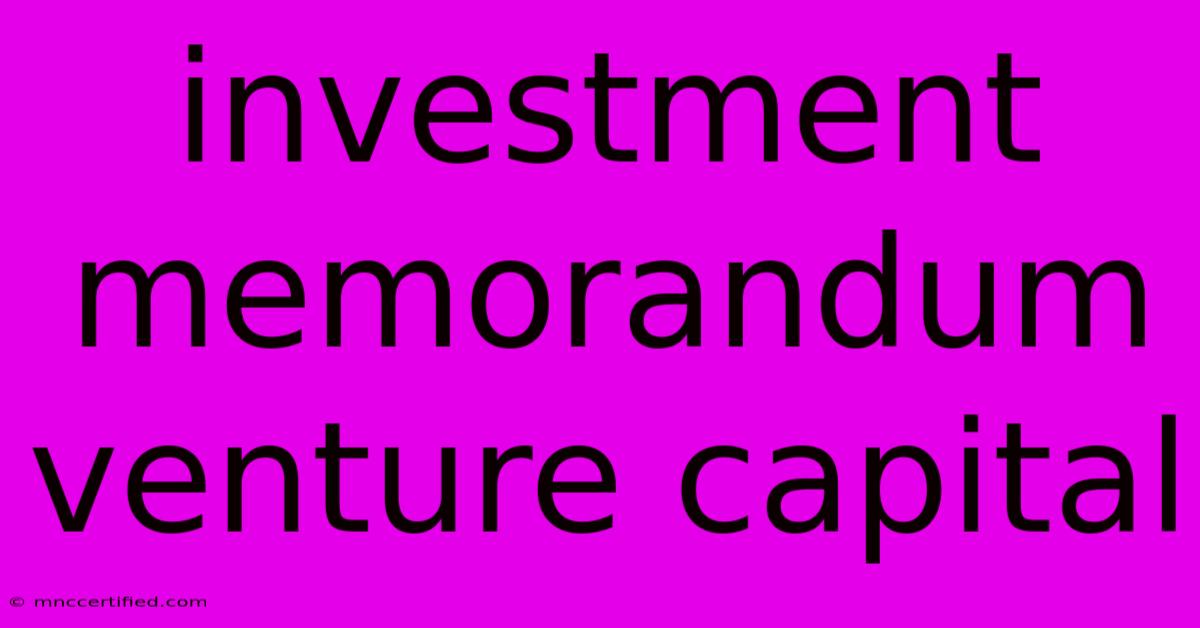Investment Memorandum Venture Capital

Table of Contents
The Investment Memorandum: A VC's Roadmap to Funding
An investment memorandum, also known as a venture capital term sheet, is a crucial document in the world of venture capital. It's essentially a contract outlining the terms and conditions of an investment between a venture capital firm and a startup. This comprehensive document serves as a roadmap for both parties, ensuring a clear understanding of the financial and operational aspects of the partnership.
Understanding the Importance of the Investment Memorandum
Imagine you're a startup founder pitching your brilliant idea to a venture capitalist. They're impressed and interested, but before committing their hard-earned capital, they need a detailed understanding of the investment terms. This is where the investment memorandum comes into play.
For the venture capitalist, it provides a structured framework to:
- Assess the risk and potential return of the investment.
- Negotiate key terms such as equity stake, valuation, and liquidation preferences.
- Clearly define the responsibilities of both parties.
For the startup founder, it acts as:
- A roadmap for securing funding and navigating the legal complexities of the investment.
- A tool for understanding the VC's expectations and aligning their vision with the firm's goals.
- A legal document protecting their interests and ensuring fair treatment.
Key Components of an Investment Memorandum
A typical investment memorandum covers several critical aspects:
1. The Investment:
- Investment amount: This specifies the total capital the VC intends to invest in the startup.
- Investment type: It clarifies whether the investment is in the form of equity, debt, or a combination of both.
- Valuation: This defines the company's worth based on the agreed-upon equity stake.
2. Equity and Ownership:
- Equity stake: Outlines the percentage of ownership the VC receives in exchange for their investment.
- Anti-dilution protection: Ensures the VC's ownership percentage remains unchanged despite future funding rounds.
- Voting rights: Specifies the VC's influence on company decisions through voting power.
3. Liquidation Preferences:
- Liquidation preference: Determines how the VC receives their investment back in case of a sale or IPO.
- Multiple of invested capital: Specifies how much the VC earns back for every dollar invested.
- Participation rights: Allows the VC to participate in the proceeds of the sale beyond their initial investment.
4. Governance and Control:
- Board representation: Defines the VC's involvement in the startup's board of directors.
- Management rights: Outlines the VC's influence on key management decisions.
- Information rights: Grants the VC access to company financials and other confidential information.
5. Additional Terms:
- Use of proceeds: Specifies how the invested funds will be utilized by the startup.
- Management fees: Covers the VC's operational costs associated with managing the investment.
- Warrants: Offer the VC the option to purchase additional shares at a discounted price in the future.
- Confidentiality provisions: Ensures the protection of sensitive information shared between the parties.
6. Closing Conditions:
- Due diligence: Defines the process for the VC to investigate the startup's business and financial operations.
- Representations and warranties: Ensures the startup has made accurate statements about its business and financial health.
- Closing date: Specifies the timeframe within which the investment needs to be finalized.
Navigating the Negotiation Process
The investment memorandum is not a static document. Both parties have the opportunity to negotiate the terms and arrive at an agreement that is mutually beneficial. This process can involve:
- Understanding each other's motivations and objectives.
- Clearly communicating expectations and addressing concerns.
- Being flexible and open to compromise.
Benefits of a Well-Drafted Investment Memorandum
A well-crafted investment memorandum serves as a foundation for a successful and long-lasting partnership between a VC and a startup. It provides:
- Clarity and transparency: A clear understanding of the terms and expectations for both parties.
- Protection of interests: Legal safeguards for both the VC and the startup founder.
- Strong foundation for future collaboration: A framework for navigating the complex relationship between investors and entrepreneurs.
In conclusion, the investment memorandum is an essential document that plays a pivotal role in the venture capital landscape. It provides a structured and transparent framework for both parties, ensuring a clear understanding of the terms and conditions of the investment. By carefully crafting and negotiating this document, startups can secure the funding they need to grow their business while VCs can make informed investment decisions and build long-term partnerships.

Thank you for visiting our website wich cover about Investment Memorandum Venture Capital. We hope the information provided has been useful to you. Feel free to contact us if you have any questions or need further assistance. See you next time and dont miss to bookmark.
Featured Posts
-
Clemson Roster Update Defender Absent
Nov 10, 2024
-
King Charles Leads Remembrance Day Ceremony
Nov 10, 2024
-
Tom Jones Addresses Uptight Incident With Apology
Nov 10, 2024
-
Chestnut Farms Bottled In Bond Review
Nov 10, 2024
-
Brighton Vs Man City Premier League Match Recap
Nov 10, 2024